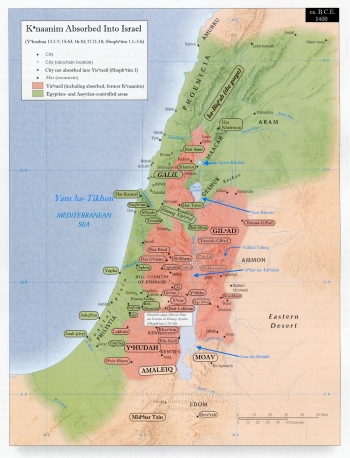wa-Yishelakh 3rd Eve
Ya•a•qovꞋ Wins By Ei•sauꞋ's Submission
Ya•a•qovꞋ Earns Noble Name: éÄùÒÀøÈàÅì

Conceding, Ei•sauꞋ asked what title Ya•a•qovꞋ had.
But Ya•a•qovꞋ had never distinguished himself as any kind of titled noble or baron in the House of Lâ•vânꞋ. "Just Ya•a•qovꞋ," he replied.
As Patriarch-Chief nobility himself, over the Ë•dōm•imꞋ, Ei•sauꞋ, Ei•sauꞋ held a proper noble position to confer nobility, with a corresponding new name, to Ya•a•qovꞋ.
"You shall no more be called Ya•a•qovꞋ," Ei•sauꞋ decreed. "Henceforth, you shall be called éÄùÒÀøÈàÅì, because ùÒÈøÄéúÈ with àÁìÉäÄéí (as well as with men1) – and you have prevailed."
Assuming that Ei•sauꞋ would likewise take away some name from this event too, éÄùÒÀøÈàÅì asked, "And what shall your name be?"
"You beat me," Ei•sauꞋ answered. "So you earned a distinguishing name; not me! Are you insisting that I take on myself a bad name?" (Noblemen, back then, would choose to be killed rather than their honor be destroyed. éÄùÒÀøÈàÅì would not pursue that option against his twin brother.) Then, as he had promised in order that éÄùÒÀøÈàÅì let him up, Ei•sauꞋ bestowed his bᵊrâkh•âhꞋ on éÄùÒÀøÈàÅì (which, having once given as a Chief, he could never reverse). Then éÄùÒÀøÈàÅì released Ei•sauꞋ to return to his battalion of men.
So Ya•a•qovꞋ named that place, located on the south bank of the éÇáÉÌ÷ River, ôÌÀðÄéàÅì – "For I saw àÁìÉäÄéí, ôÌÈðÄéí àÆì-ôÌÈðÄéí and was rescued." 2
Then the sun rose as he passed through ôÌÀðÄéàÅì, limping from the sciatica he had suffered from his fight with Ei•sauꞋ.
This is why, that to this day, Bᵊn•eiꞋ-Yi•sᵊrâ•eilꞋ doesn't eat cuts of meat containing the sciatic nerve – commemorating that Ë•dōmꞋ struck Ya•a•qovꞋ's sciatic nerve, maiming him for life and leaving him with sciatica and a permanent limp.
Ei•sauꞋ Arrives Officially
 |
Later in the day, Ya•a•qovꞋ looked up and saw the official arrival of Ei•sauꞋ with his battalion of 400 ish. (Now, éÄùÒÀøÈàÅì had divided his camp into two groups: LeiꞋâh and Râ•kheilꞋ with their children rearmost, farthest north, with Râ•kheilꞋ and Yo•seiphꞋ farthest north to the rear) and the two maids, with their children, to the south, nearest the front line. Leading his front line warrior ranch-hands, éÄùÒÀøÈàÅì had crossed the éÇáÉÌ÷ River to the south bank.
As they had prearranged after their fight, éÄùÒÀøÈàÅì bowed 7 times as he went out in front of his company, until he was within hailing distance of his twin brother.
Then Ei•sauꞋ ran out in front of his forces to meet his twin brother, whereupon he hugged him, embraced him around the neck and bestowed the customary Middle-Eastern cheek-kisses; a reunion that brought them both to tears. Ei•sauꞋ looked up and saw the women and children. "Who are these with you?" he asked.
"These children are the Graciousness of Ël•oh•imꞋ toward your servant," éÄùÒÀøÈàÅì replied. At this point, the maids arrived with their children, and they bowed to Ei•sauꞋ. Then LeiꞋâh arrived with her children, and they bowed to Ei•sauꞋ. Finally, Yo•seiphꞋ and Râ•kheilꞋ arrived, and they bowed to Ei•sauꞋ.
"From whom, of your camp, were all of those herds that I met?" Ei•sauꞋ asked.
"They were to find graciousness in your eyes, a•don•iꞋ," éÄùÒÀøÈàÅì replied.
"I have great wealth," Ei•sauꞋ interjected. "Let what's yours be yours."
"Please, no" Ya•a•qovꞋ insisted. "If, please, I've found graciousness in your eyes then take my mi•nᵊkh•âhꞋ, because you wanted me; I saw it in your face and it was like I was seeing the Face of Ël•oh•imꞋ. Please take my bᵊrâkh•âhꞋ that was brought to you, because ël•oh•imꞋ has been gracious to me. I have everything I want." So éÄùÒÀøÈàÅì urged his twin brother, and Ei•sauꞋ acceded to take it.

Optional parental preparation:
- Note 1 – The only (and conspicuous) ish that would be fighting with Ya•a•qovꞋ was his elder twin brother, Ei•sauꞋ.

- Note 2 – The text reads àÁìÉäÄéí (ël•oh•imꞋ), not îÇìàÈê (ma•lâkhꞋ) as some commentators mislead in order to retain mythology while avoiding the Scripture that declares that no man has seen His Face and lived (Shᵊm•otꞋ 33.20). A priori, exactly as Scripture specifies (bᵊ-Reish•itꞋ 32.25), this could only have been an ish: Ei•sauꞋ!!!

Questions you might anticipate that your child might raise and be prepared to discuss:
- What's a Middle-Eastern cheek-kiss greeting?
- What does the Creator's Face look like? (Not being physical, the Creator is like a concept, idea or thought; there is no Face to be seen by physical light or discernible to a physical eye or detectable by any physical instrument. One can only speak of a non-physical Presence; the Shᵊkhin•âhꞋ or RuꞋakh ha-QoꞋdësh.)
Google+ registered author & publisher

